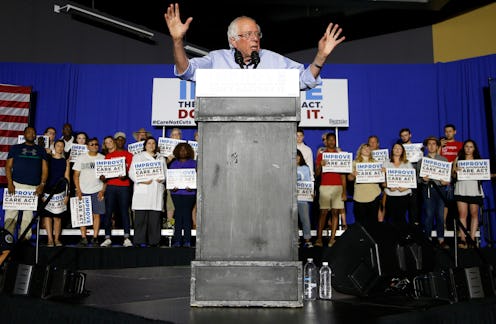News
Why Bernie Sanders Can’t Say How Much His Medicare-For-All Plan Would Cost

On Wednesday afternoon, Senator Bernie Sanders, along with numerous other leading Democrats, announced the details of his "Medicare-For-All" health care plan. Under Sanders' proposal, private health insurance, including both employer-based plans and the individual market, will be phased out to put everyone in America on a government plan. The policy idea is incredibly ambitious, but for now it fails to answer one key question: how much will Sanders' Medicare-For-All plan cost?
The idea of government-provided health care for all Americans is popular among voters, but loses a lot of support when the poll question includes whether we should raise taxes to pay for it. Presumably this would be true as well if we asked similar questions about multi-trillion dollar wars or even things as uncontroversial as helping people after a hurricane, but I'm just reporting how pollsters ask it. So the question of how much the Sanders plan costs and how we'll pay for it will need to be figured out before it can ever be passed. And, without yet receiving a score from the Congressional Budget Office, it's hard to say exactly how expensive it would be.
Sanders' plan leaves out the details of any tax increases that would go with it. "Rather than give a detailed proposal about how we’re going to raise $3 trillion a year, we’d rather give the American people options,” Sanders told the Washington Post. In that respect, Sanders' plan is perhaps more like a wish-list of what the most expansive health care proposal could be, and a starting point for future discussions over the Democratic base's favorite policy. “The truth is, embarrassingly, that on this enormously important issue, there has not been the kind of research and study that we need."
Sanders' version of a government health care guarantee would probably be pretty pricey. He is proposing the most expansive version of government-provided insurance, which would include coverage for all medical conditions, including vision and dental coverage, without any copays paid by patients for their coverage. This is actually a far more generous version of government health care than Medicare, Medicaid, or any other country with a single-payer health care system offers. Even the United Kingdom's National Health Service, where doctors are paid directly by the government to treat people, has patients pitching in some co-pays to cover the costs. Sanders' idea would be the biggest and most generous public-insurance program in the world, and therefore would probably cost more than any comparison.
Various estimates have been made so far of the Sanders plan and others like it, and predictably, everyone disagrees which one is correct. When Sanders proposed Medicare-For-All during the 2016 presidential campaign, the Urban Institute, a left-of-center think tank, calculated that Sanders' plan would cost $32 trillion over a decade. CNN on the other hand reports that this current plan would cost closer to $1.4 trillion a year.
Advocates of a government health care guarantee argue that looking at the initial sticker price or the amount of tax increases necessary ignores some of the ways that in the aggregate, a single payer system would lower healthcare costs. Tax increases would replace health insurance premiums, which many Americans already feel are too high. Because a single insurance payer could eliminate a significant amount of administrative waste in the health care system (hospital billing becomes a lot simpler when you can just send all bills to the government and know they're covered), and the government holds large bargaining power over medical prices (representing all consumers) the overall price of health care costs under a government-run system would likely be lower than it is under the private-insurance system.
It's hard to argue that the current system is working perfectly. The United States spends far more per-capita on health care than any similar country, and the outcomes it gets don't live up to the costs. The United States has the highest health industry spending of any OECD country, but only the 27th highest life expectancy.
But even if Sanders and his allies are right, and switching to government-funded health insurance would significantly lower health care costs in the long run, it would almost certainly require heavy tax increases in order to be implemented. And even if those tax increases would make up for the costs of premiums and wage deductions that Americans currently have to pay for to get health care, they will be felt by taxpayers as they show up on tax bills.
Sanders, who became famous during the 2016 election for attacking "millionaires and billionaires" would probably never dream of taxes to pay for his bill that would come equally from all Americans. Presumably, he'd seek a heavier tax burden from the rich to pay for it than from the working class. So in addition to shifting health care costs from individuals to the greater system, the Sanders plan would almost definitely mean shifting health care costs from the poor to the rich. And by expanding the coverage and thereby lowering out-of-pocket costs for the sick, this plan would also increase the amount that payments from healthy people subsidize the care of the sick.
Sanders got his support in 2016 by espousing the ideals of Democratic Socialism. In pursuing a plan that would shift health care costs from the rich and the healthy to pay for better care for the poor and the sick, he's making it clear what he meant.